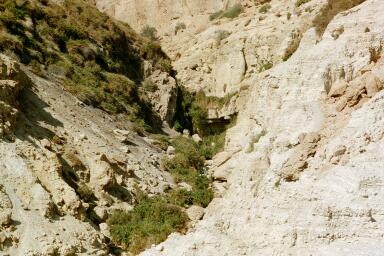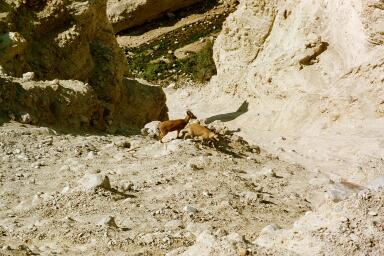
 On our last day in Israel we travelled "down" towards the Dead Sea. "Down" is the word Ė we passed a sign that said "Sea Level" and kept going!
On our last day in Israel we travelled "down" towards the Dead Sea. "Down" is the word Ė we passed a sign that said "Sea Level" and kept going!The countryside is dry and inhospitable. Barren rocky mountains dominated our view to the right side of the bus. The very few date plantations must have been dependent on the Jordan River and on careful shepherding of the meagre rainfall.
We stopped briefly at the Nahal David Nature Reserve. From this vantage-point we could see En-Gedi. The "Lonely Planet" guidebook describes this area in these terms, "One of the countryís most attractive oases, En Gedi (Spring of the Kid) is a lush area of freshwater springs, waterfalls, pools and tropical vegetation nestled in the arid desert landscape of the lowest place on earth."

From the lookout we could see a patch of lush vegetation and a small stream of fresh water cascading down the narrow valley.
In the distance we could make out hikers on the walking tracks that run through the area. With more time we might have joined them!
Our guide had hoped to show us the male ibex here Ė a species of wild goat with long curved horns. We had to be satisfied with a couple of young females. These and other animals are attracted to and benefit from the spring in the desert.
 Archaeology dates human habitation at En Gedi from 3000 BC until it stopped in the Byzantine period.
Archaeology dates human habitation at En Gedi from 3000 BC until it stopped in the Byzantine period.
At the end of 1 Samuel 23, we read that David and his loyal supporters were fleeing the anger of Saul and "went upÖ and lived in the strongholds of En Gedi" (v. 29). Chapter 24 says that Saul and his 3000 men were looking for David and his men near "the Crags of the Wild Goats" (v. 2).
David and his men went to En Gedi for some obvious reasons. There was a continuous water supply. It was a good hide-out with rocks and caves. They were well and truly outnumbered, but would have a good chance of defending themselves.
A spring in the desert Ė thatís a place of refreshment, a break from the pressures, a time to regain perspective and to refocus life on the LordÖ
Imagine what David could have thought when scouts brought warning that Saul and 3000 crack soldiers were almost thereÖ. But when Saul came alone into the cave where they were hiding, Davidís men thought it too good to be true Ė the Lord has given Saul into your hands (v. 4).
True, Saul was "in Davidís hands." What should he do? Being able to do something doesnít make it right! Saul was his father-in-law. He was also the anointed king. David had been anointed to be the next king, and Saul was intent on killing him.
How would we have reacted? Thankfully, it isnít our situation! Or is it? Sometimes we imagine we could be very good Christians if it werenít for someone else! Our much-needed refreshment and renewal seems broken whenever we recall this other personís words or actions.
We donít have to react. We can choose not to react. Remember what Jesus said to the Samaritan woman Ė "whoever drinks the water I give him will never thirst. Indeed, the water I give him will become in him a spring of water welling up to eternal life." (John 4.13-14).
Thatís not just for you Ė itís for others too!
So donít forget the spring in the desert! And, by word and action, remember to offer it to the other person too!
| PRAYER: Dear Father, sometimes we feel dry. We come to you to be refreshed and encouraged, but often the memory of someone else intrudes to disturb our peace. Lord, we donít just want to come for your living water ourselves. Live in us by your Spirit, so that we can become an overflowing spring for others too. In Jesusí name, Amen. |
In a dry
and barren
world,
Godís Spirit
lives
within me
to be a spring,
welling up,
overflowing,
bringing
life for all.
Lord,
fill me Ė
overflow
through me!
Back to Sermons